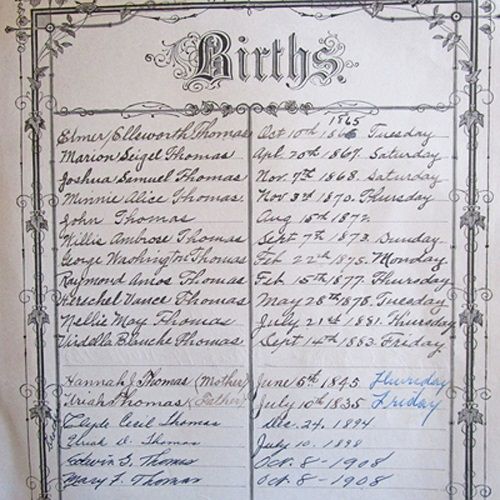Looking through the Library of Congress’s collection “Voices Remembering Slavery: Freed People Tell Their Stories” 1 I was frustrated with the lack of information. When the Federal Writers Project was conducting these Slave Narrative interviews they did not take very accurate records. Part of that is the issue is that there was not a standard for how these interviews were done, and part of that is the fact that record taking in general had not developed as we know it yet. Even the question of how old a person is at any given time is not constant. In one interview a man named Billy McCrea of Jasper Texas 2describes that he isn’t even exactly sure how old he is. At different points and what I assume are census recordings there was a variation. He is somewhere between 89 and 117. 3.
Often in that time period the only record of a person’s birth, life and death was kept in a family bible. People did not have much, but they nearly always had a family bible.

I listened to many of the interviews and read the accompanying transcripts trying to find one that I was able to understand and had relative content for the assignment.
For my timeline I looked at the “Interview with Uncle Bob Ledbetter in Oil City, Louisiana 4 . John and Ruby Lomax interviewed Bob in 1940. There was a lot of potential information, however much of it is assumed. There is no mention of dates, so I have based every date listed on a rough calculation. For example, the interview takes place in 1940 and Uncle Bob is 73. I worked backwards assuming that he was born in 1867, was probably about 10 years old when his father taught him to read, a teen when he saw his friends in jail and 21 when he could have voted in the 1892 Presidential Election. I was able to use 1887 as the date of his marriage since he said he was 20 years old. I really took some creative license and tried to apply a reasonable age to events. I was surprised that the Lomax’s did not press him for more information about his life. I would have thought that it would have been important to their project.
The limitations of these interviews are the oral story in itself. I listened to many of the interviews and read the accompanying transcripts trying to find one that I was able to understand and had relative content for the assignment. Most of the recordings are very difficult to understand. I am a little hard of hearing, so it was pretty difficult. The assignment scope was just to listen 5 but unfortunately I found that only using the audio was impossible for me. I listened to it to get a feel for the overall flow of the interview, but I used the transcript for actual information. Some of the transcripts have a disclaimer about the poor quality of the recordings and include passages where the transcriber simply used “????????” or (unintelligible). Being as we are in such a digital age I had previously put a lot of value on oral history. I still think that it is important, but now include the caveat that it is only as useful as the reliability of the recorded media. Oral histories that have been transcribed are more useful than a beeswax recording roll that is garbled and not understandable.
Listening to the overall tone of the recordings were insightful however. Some of the people interviewed were very animated and impassioned talking about certain subjects. Other times it seemed obvious that they did not want to go into greater detail but felt pressured by the interviewer. The dynamic is interesting, there seems to be a wariness, and maybe a condescending feel to how they interviewed people. They certainly don’t all flow naturally though. This was an interesting assignment and showed me that oral histories are valuable but that the way they are recorded can have a significant impact on their usefulness. When they are also made available with text they are far more useful and can really tell a fuller story.
- Library of Congress. Born in Slavery: Slave Narratives from the Federal Writers’ Project, 1936 to 1938.”An Introduction to the WPA Slave Narratives.” https://www.loc.gov/collections/slave-narratives-from-the-federal-writers-project-1936-to-1938/articles-and-essays/introduction-to-the-wpa-slave-narratives/
- Lomax, John and Ruby. Library of Congress.“ Interview with Uncle Billy McCrea, Jasper, Texas, 1940 (part 1 of 2)”. https://www.loc.gov/item/afc1940003_afs03974a/ Accessed 10/24/19
-
John A. Lomax: And how old are you Uncle Billy?
Uncle Billy McCrea: Well I— —could tell you my age. Now I, I don’t rightly know my age. But I can tell you what I go for. The fifteenth of this, of October, I be eighty-nine. Eighty-nine-years-old. And on the second time, the way they’ve got my age fixed there on the fifteenth I will be a hundred-and seventeen-years-old. But I register in the courthouse, of my age be ninety-eight, ah eight, no eighty nine, this coming, the fifteenth of this month. Next Oc, October.
- Lomax, John and Ruby. Library of Congress. “Interview with Uncle Bob Ledbetter, Oil City, Louisiana, 1940”. https://www.loc.gov/item/afc1940003_afs03992a/ Accessed 10/24/19.
- Dauterive, Jessica. “Oral History//Timelines”. Lecture. GMU. 10/16/19
